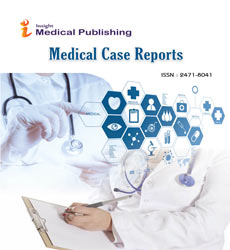Proteinuria and Arthralgia in Muckle-Wells Syndrome: Examining the Clinical Spectrum
Brittany Misty
Department of Head and Neck Surgery, Radboud University Nijmegen Medical Centre, Nijmegen, Netherlands
Published Date: 2023-11-24DOI10.36648/2471-8041.9.11.335
Brittany Misty*
Department of Head and Neck Surgery, Radboud University Nijmegen Medical Centre, Nijmegen, Netherlands
- *Corresponding Author:
- Brittany Misty
Department of Head and Neck Surgery,
Radboud University Nijmegen Medical Centre, Nijmegen,
Netherlands,
E-mail: Misty_b@runmc.nl
Received date: October 24, 2023, Manuscript No. IPMCRS-23-18249; Editor assigned date: October 27, 2023, PreQC No. IPMCRS-23-18249 (PQ); Reviewed date: November 10, 2023, QC No. IPMCRS-23-18249; Revised date: November 17, 2023, Manuscript No. IPMCRS-23-18249 (R); Published date: November 24, 2023, DOI: 10.36648/2471-8041.9.11.335
Citation: Misty B (2023) Proteinuria and Arthralgia in Muckle-Wells Syndrome: Examining the Clinical Spectrum. Med Case Rep Vol.9 No.11: 335.
Description
Muckle-Wells Syndrome (MWS) stands as a rare autoinflammatory disorder characterized by a constellation of symptoms that significantly impact affected individuals. Among these symptoms, proteinuria and arthralgia emerge as noteworthy components, shedding light on the diverse clinical manifestations of this condition. Muckle-Wells syndrome, a subset of Cryopyrin-Associated Periodic Syndromes (CAPS), arises due to mutations in the NLRP3 gene, leading to excessive inflammation within the body. Periodic syndromes refer to a group of rare autoinflammatory disorders characterized by recurrent episodes or "periods" of inflammation and associated symptoms. These syndromes are typically caused by genetic mutations that lead to dysregulation of the immune system, resulting in excessive inflammation within the body. One subset of periodic syndromes is known as the Cryopyrin-Associated Periodic Syndromes (CAPS), which include conditions like Familial Cold Autoinflammatory Syndrome (FCAS), Muckle-Wells Syndrome (MWS), and Neonatal-Onset Multisystem Inflammatory Disease (NOMID) or Chronic Infantile Neurological, Cutaneous, Articular (CINCA) syndrome.
Proteinuria
These syndromes are rare and often challenging to diagnose due to their variable presentation and overlap with other conditions. Genetic testing and consultation with specialists familiar with auto inflammatory disorders are often crucial for accurate diagnosis and appropriate management. Understanding periodic syndromes like CAPS is essential not only for timely diagnosis and management but also for on-going research to improve treatment options and enhance the quality of life for individuals living with these rare conditions. This chronic inflammation gives rise to periodic flares, often encompassing a spectrum of symptoms affecting multiple systems in the body. Proteinuria, the presence of abnormal quantities of protein in the urine, is recognized as one of the less common yet significant manifestations of muckle-wells syndrome. This occurrence points towards renal involvement in this systemic disorder. Proteinuria in MWS might not always present in all affected individuals, but its presence underscores the disease's impact on the kidneys and the potential for renal complications. The exact mechanisms behind proteinuria in muckle-wells syndrome remain under investigation. The inflammatory cascade triggered by NLRP3 gene mutations likely plays a role in the impairment of renal function, leading to the abnormal passage of proteins into the urine. Arthralgia, or joint pain, represents a prevalent and distressing symptom in Muckle-Wells syndrome. The recurrent and often severe joint pain experienced during flares significantly affects the quality of life for individuals living with this condition. The joints affected can include those of the hands, knees, elbows, and hips, among others. The inflammation causing arthralgia stems from the body's immune system responding inappropriately, leading to the release of inflammatory mediators that target the joints. This chronic inflammation contributes to pain, swelling, and sometimes joint damage if not adequately managed. While proteinuria and arthralgia represent distinct manifestations of muckle-wells syndrome, their correlation within the clinical spectrum of the disease remains an area of on-going research.
Arthralgia
The systemic inflammation underlying MWS appears to impact various organs and tissues, including the kidneys and joints, contributing to these diverse symptoms. It's hypothesized that the inflammatory cascade triggering arthralgia might also influence renal function, potentially contributing to proteinuria in affected individuals. The interplay between systemic inflammation, immune deregulation, and organ-specific manifestations highlights the intricate nature of Muckle-Wells Syndrome. Diagnosing muckle-wells syndrome requires a high index of suspicion, considering its rarity and variable presentation. Genetic testing for NLRP3 mutations aids in confirming the diagnosis, enabling timely intervention. Management primarily focuses on mitigating inflammation and alleviating symptoms during flares. Targeted therapies, including Interleukin-1 (IL-1) inhibitors, have shown efficacy in managing symptoms like arthralgia and potentially impacting proteinuria in some cases. In conclusion, proteinuria and arthralgia represent integral aspects of the clinical spectrum of muckle-wells syndrome, underscoring the systemic nature of this auto inflammatory disorder. Continued research into the mechanisms linking these manifestations could provide valuable insights into the disease pathophysiology and aid in developing more targeted therapeutic approaches to improve the lives of those affected by MWS. This article aims to shed light on the correlation between proteinuria and arthralgia in muckle-wells syndrome, emphasizing the complexity of this rare condition and the need for further investigation into its diverse clinical manifestations.

Open Access Journals
- Aquaculture & Veterinary Science
- Chemistry & Chemical Sciences
- Clinical Sciences
- Engineering
- General Science
- Genetics & Molecular Biology
- Health Care & Nursing
- Immunology & Microbiology
- Materials Science
- Mathematics & Physics
- Medical Sciences
- Neurology & Psychiatry
- Oncology & Cancer Science
- Pharmaceutical Sciences
